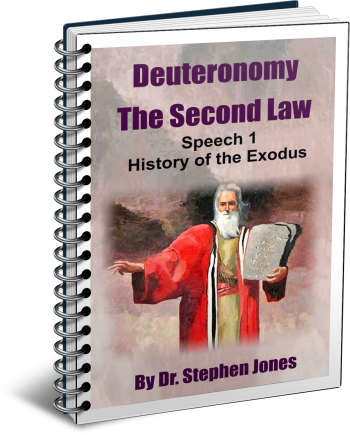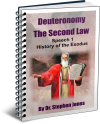Latest Posts
View the latest posts in an easy-to-read list format, with filtering options.

A commentary on the first speech of Moses in Deuteronomy 1-4. The book of Deuteronomy is a series of 12 speeches that Moses gave just before his death at the end of Israel's wilderness journey.
Category - Bible Commentaries

Moses' first speech in the book of Deuteronomy is entitled, History of the Exodus. Picture Moses standing at the podium, ready to give a historic speech. He begins in Deut. 1:6.
6 The Lord our God spoke to us at Horeb, saying, “You have stayed long enough at this mountain. 7 Turn and set your journey, and go to the hill country of the Amorites, and to all their neighbors in the Arabah, in the hill country and in the lowland and in the Negev and by the seacoast, the land of the Canaanites, and Lebanon, as far as the great river Euphrates. 8 See, I have placed [opened up] the land before you; go in and possess the land which the Lord swore to give to your fathers, to Abraham, to Isaac, and to Jacob, to them and their descendants after them.”
The first thing that Moses established is that God gave this land to Israel as an inheritance and that they were therefore to possess it. It was promised to Abraham, Isaac, and Jacob, but they each lived there as aliens, strangers, and pilgrims, not possessing the land themselves.
They were supposed to inherit the land on the 50th Jubilee from Adam, the day that the 12 spies had given their report in Numbers 13, 14. However, they had been unable to do so, due to their lack of faith. Furthermore, the grace period given to the Canaanites since Noah's curse in Gen. 9:27 had not yet expired, for God gave them two periods of grace, or “Cursed Time” (2 x 414 years). Canaan yet had 38 years of grace remaining. (See Secrets of Time, chapter 4.)
When that final grace period expired without Canaan's repentance, then Moses informed the Israelites that God had opened up the land to them. It was time to bring judgment upon Canaan and to enter their inheritance. Yet they did not receive their inheritance in a Year of Jubilee. The timing of their entry occurred on the day when they were to select the lambs for Passover (Josh. 4:19).
When events do not happen on Appointed Times, they are inevitably only types and shadows of the real fulfillment. If they had entered Canaan at the Appointed Time on the 50th Jubilee from Adam, they would have fulfilled that prophetic Day, and the fullness of the Kingdom would have been established. Yet although this was indeed God's will, it was not God's plan for them to do this, for God intended the Kingdom to be established after the coming of Christ.
In fact, God had already established the feast of Passover as a type and shadow of the crucifixion of the true Lamb of God that was to come later. Israel lived by types and shadows from the start, showing that God's intent and plan was to establish a pattern for something much greater in the future.
We catch a glimpse of the greater plan in Hebrews 11:8-10. Abraham's inheritance appeared to be the land of Canaan, but in reality “he was looking for the city which has foundations, whose architect and builder is God” (vs. 10). Verse 16 says,
16 But as it is, they desire a better country, that is a heavenly one. Therefore, God is not ashamed to be called their God; for He has prepared a city for them.
In other words, Jerusalem was a type of the New Jerusalem, and Canaan was a type of the Kingdom. It is not that the New Jerusalem is heaven, but that it is heavenly people, rather than holy real estate. Likewise, the temple of God is no longer one made out of wood and stone and gold, but “living stones” (1 Peter 2:5). Solomon's temple was only a type and shadow of something greater.
There is no doubt that under the Old Covenant Canaan was the Promised Land and the inheritance of Israel. But it was not the final fulfillment of the promises of God. What God did in Canaan was only an early pattern of what God intended for the whole world. Probably the main difference is that while Canaan was conquered by a physical sword under the Old Covenant, the world is to be conquered by the Sword of the Spirit under the New Covenant.
For this reason, while we can certainly appreciate Moses' reiteration of Israel's calling and the fact that God did indeed give them the land of Canaan, we cannot apply this fully to the situation today. The command under Moses to destroy the Canaanites by the sword is now superseded by the Great Commission, by which we conquer the world by means of the Sword of the Spirit under the New Covenant.
For further study into this manner of thinking, see The Struggle for the Birthright, chapter 8, entitled, “The New Jerusalem.” There we show how the Hebrew word for the city is Yerushalayim, which is plural—“Jerusalems,” so to speak. It is as if the name itself prophesied of two cities, one earthly and the other heavenly. The earthly was the type; the heavenly is the real inheritance that Abraham sought.